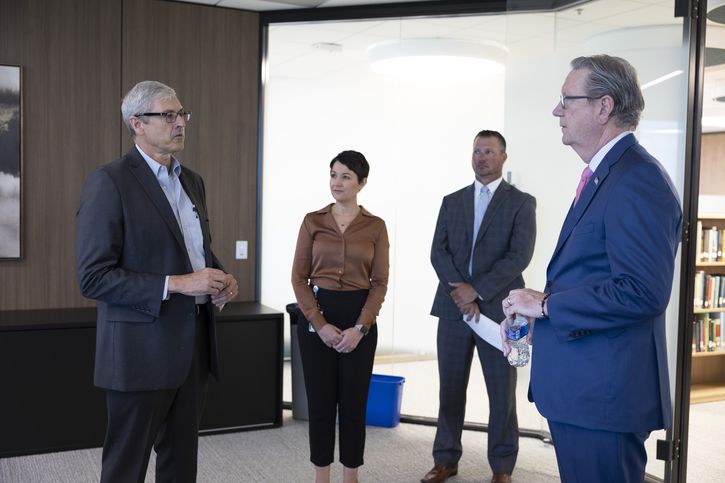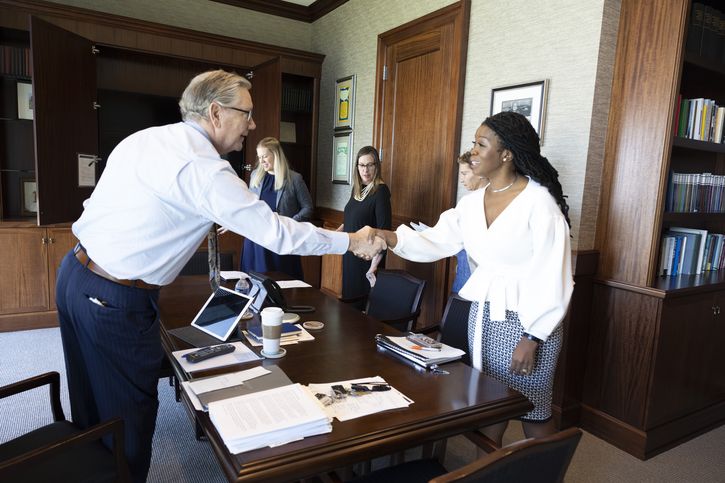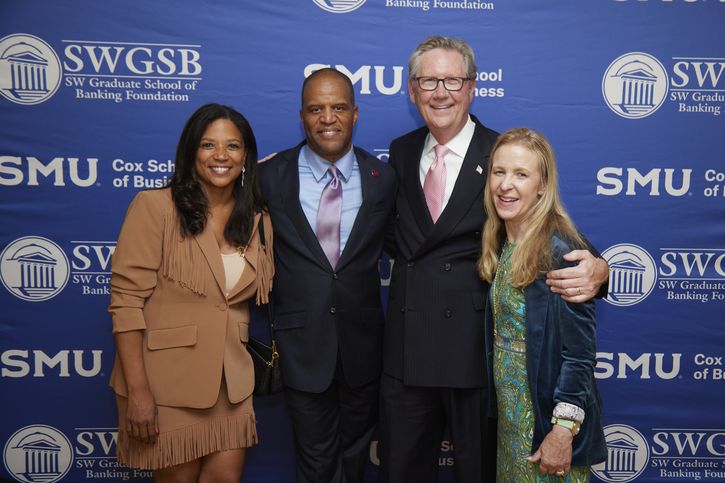When the caller asked Jeff Schmid about the open president’s position at the Kansas City Fed, Schmid thought they wanted him to suggest candidates.
Did they want to talk about someone he’d known or possibly worked with during his nearly 30 years of banking in Nebraska? Maybe they had some questions about a recent graduate of the Southwest Graduate School of Banking (SWGSB) at Southern Methodist University’s Cox School of Business that he was leading?
No, they told Schmid. “We want to talk about you.”
The inquiry was unexpected for a couple of reasons:
The Kansas City Fed had nine presidents in its history. Of those, only two started the job without a previous connection to the Bank: Charles Sawyer, who only briefly held the job when the Bank opened for business in 1914, and George Hamilton, a Wichita banker who was appointed president in 1932.
And Esther George, whom he has known and who retired from the president’s position in January 2023 under mandatory retirement rules, is the same age as Schmid. Based on her retirement, Schmid thought the same requirement would apply to him.
On the second point, Schmid learned that the Fed’s mandatory retirement rules allow presidents appointed after age 55 to serve up to 10 years as president.
And on the first point, the Kansas City Fed’s Board of Directors were focused on finding someone who was a match for the Tenth District—a seven-state region that is home to nearly one-quarter of all community banks in the United States and a Federal Reserve District with more state-member and nationally-chartered banks than any of the Fed’s 11 other Districts.
“Jeff has extensive experience in the banking industry, and he’s not a stranger to the Tenth District,” said Patrick Dujakovich, chairman of the Kansas City Fed’s Board of Directors and president of the Greater Kansas City AFL-CIO. “We really wanted to find the perfect candidate—somebody to represent our District.”
In August, Dujakovich introduced Schmid as the tenth president of the Federal Reserve Bank of Kansas City.
Unlike most of Schmid’s counterparts around the policy-setting Federal Open Market Committee meeting table, he is not an economist, but a lifetime of banking has made him well-positioned to bring an important practical banking perspective to the deliberations.
“As far as my own experiences, you cannot run a bank without knowing how the economy works,” Schmid said. “If you fail to do that, your bank will either be low-performing or it will fail. You have to understand cycles. You have to understand the monetary policy process…There’s a lot of really smart people around monetary policy that do that as a science. I am not a scientist. We certainly have a staff of strong economists at the Kansas City Fed, and our District is going to be a beneficiary of their work.
“But there are other parts of the Fed’s areas of responsibility that are also really important, including the payments system and the safety and soundness of banks. Those are all things that I’ve lived.”

During tours of Bank offices with Facilities Management Assistant Vice President Matt Ruemker (right center), Jeff Schmid stopped in the Economic Research Division to talk with Assistant Vice President Bob Hampton (left) and Vice President Jennifer O'Bryan. Photo by Gary Barber
The Nebraska native
Schmid grew up in Papillion, Nebraska, when the Omaha suburb was one of those ideal small towns just close enough to the city for convenience but far enough away that it did not intrude on the rural charm.
While Schmid would end up being a second generation Nebraska banker, the first generation—his father, Albert—originally had other visions for the family.
“My dad so desperately wanted to be a farmer,” Jeff Schmid said. “He just had this farmer blood in him.”
But after Albert finished a stint in the Air Force, he returned to find the farm economy in a drought-induced tailspin. Rather than heading to the field, Albert went to work at a bank mailroom, taking what turned out to be the first steps in a career ladder that would eventually see him rise to become a bank president.
“He basically educated himself about banking,” Jeff Schmid said.
Jeff, meanwhile, graduated from the University of Nebraska and was soon offered two positions: One as a commodities trader in Chicago and another with the Federal Deposit Insurance Corporation. It was a fairly easy choice.
In Chicago “it was chaos and high stress. I was talking to guys in their 20s who had ulcers,” he said. “And meanwhile I was intrigued by the banking business.”
So he turned down the Chicago offer and accepted the FDIC position.
This was between the November 1980 presidential election and newly-elected President Ronald Reagan taking office in January 1981. Reagan’s first act as president was to implement his promised freeze all government hiring. However, he made the freeze retroactive to election day. At the time, the government estimated that the freeze affected 6,000 would-be government workers, while labor unions argued that the number it was far higher. Regardless, Schmid was one of those individuals who saw his job offer rescinded.
“I went from two jobs to zero jobs,” Schmid says. “My folks were pretty worried.”
Eventually, the hiring environment changed and Schmid joined the FDIC in Kansas City. If he hoped to avoid some of the chaos and stress he saw on the Chicago trading floor, however, he was mistaken. Soon he was a bank examiner in the midst of a major banking crisis. In the 1980s around 1,500 banks failed and more received assistance. The Tenth Federal Reserve District was particularly hard hit with, 350 banks either failing or receiving assistance.
In the midst of the crisis, the already difficult job got a little bit more uncomfortable or at least awkward.
In 1986, the FDIC offered him a development opportunity and so Schmid opted to attend the SWGSB with some interesting classmates given the ongoing banking sector turmoil.
“You had bank examiners and regulators in the room with a couple hundred bankers,” Schmid said. “It was pretty hard, but it was an interesting dynamic to have the regulators and the bankers in that same room trying to learn how to run a great bank. And it was a great time to learn.”
Soon after graduation, Schmid decided it was time for a career move. With the crisis concluding, he realized that his workload was going to be changing dramatically. Instead of dealing with a crisis, much of his time would now be focused on paperwork related to an expected cycle of post-crisis banking industry mergers.
Schmid wanted new opportunities, and maybe now, with the crisis passed, it was time to make a job switch.
“I thought it would be a good time to go back to where I was from and give banking a shot,” he said.

Jeff Schmid’s first week on the job included an onboarding session with (from left) Senior Vice President and Chief Human Resources Officer Amy Cole, Vice President Christina Robertson, Executive Administrative Assistant Amy LaFave and People, Culture and Strategy Advisor A’Yanna Webster. Photo by Gary Barber
Relationship banking
American National Bank of Sarpy County opened in Papillion in the summer of 1989. In 1995, Schmid was promoted to president and director of the American National Bank parent bank, where he oversaw the merger of four bank charters into the single American National Bank brand.
“I would not say that we were a commercial bank, we were a relationship bank,” Schmid said. “The most important thing about a bank is the relationships you have with a business or a person.
“Money’s a tool, right? You have to be educated about it and how it can be useful and in the ways it can be dangerous. And then you put a plan together for the borrower and that is when the magic starts.”
At American National, a lot of that magic involved lending to small businesses, for example, to help them become established or grow.
“There are some people in the world that just want to pay their bills and have a good credit score,” Schmid said. “Others want to build businesses. Others want to use credit and leverage. And helping all of those people is why I love being in the banking business. When it’s done right, it can change lives.”
By the mid-2000s, Schmid was considering a change and exploring starting a new bank, likely based in Omaha, Kansas City or Dallas. Conversations with insurance provider Mutual of Omaha about providing some of the capital led to a change in Schmid’s business model, with Mutual of Omaha establishing the Bank and Schmid serving as chairman and CEO.
“So, instead of starting a bank with $50 million in capital, we had $500 million in capital and we had a big brand,” Schmid said.
The bank was launched in 2007, just as the nation was headed into a banking crisis. Since Mutual of Omaha was highly liquid, it was well-positioned to acquire a number of banks over the next few years, growing from a handful of Nebraska locations to a bank with branch offices in Arizona, California and Nevada. It was a $9 billion bank when Mutual of Omaha decided to exit the banking business in 2020.

Jeff Schmid has served on the Board of Directors of Operation Hope, which promotes financial literacy and economic equity. Pictured (from left) at a June 2023 banquet hosted by Southwestern Graduate School of Banking in Dallas: Chaitra Bryant and her husband, Operation Hope founder and CEO John Hope Bryant, Jeff Schmid and his wife, Amy Schmid. Photo courtesy of Southwestern Graduate School of Banking at the SMU Cox School of Business
Broadening perspectives
For Schmid, the Mutual of Omaha experience also expanded his relationship with officials at the Federal Reserve Bank of Kansas City. In the 1980s, they had worked as partners while he was at the FDIC. Now, Schmid was coming to the Kansas City Fed as a banker in a unique situation: Often bank holding companies are relatively small entities that own larger banks. With Mutual of Omaha, it was a massive and well-established insurance company that was owning a smaller banking business. The process, he said, included the beginning of what he calls a very collaborative relationship with his Kansas City Fed predecessor Esther George that continues to this day.
After the sale, Schmid worked for a Dallas-based bank that transitioned from a small community bank to a larger privately-owned bank, steering the institution through the pandemic, during which much of the work ended up focusing on Paycheck Protection Program loans. The Bank’s chairman and majority owner then assumed the CEO role and took the bank private.
And then the SWGSB presented an opportunity.
“I’ve always been a lifelong learner and try to take opportunities as they come and to try to grow with them.”
There are some similarities between Schmid’s new job and his time at SWGSB.
Since its founding in 1957, the graduate school for bankers had operated under the leadership of an academic. In 2021, however, they turned to Schmid—a longtime community banker. SMU has plenty of academics with PhDs—a program focused on developing banking industry leaders should be led by someone with real world experience.
“They wanted someone who was a practitioner instead of a professor,” Schmid said.
Now, he is looking forward to getting out in the communities of the Tenth District, meeting with business and community leaders from throughout its seven states. Making connections and building the relationships that were at the heart of his banking career, but the focus will be on gaining perspective to the economic environment and the emerging challenges and opportunities for Tenth District communities.
He will be the District’s representative in monetary policy deliberations and an important voice on banking supervision and regulation as well as the Fed’s work in the payments system. It’s all part of the job of being a central banker, even one who is still a community banker at heart.
“A bank charter creates a kind of special entity,” Schmid said. “It’s not a place to take big risks or use a lot of leverage. A bank’s job is to help a community build something, and the bank has to be safe and sound. It has to be done right.”
The views expressed are those of the authors and do not necessarily reflect the positions of the Federal Reserve Bank of Kansas City or the Federal Reserve System.
